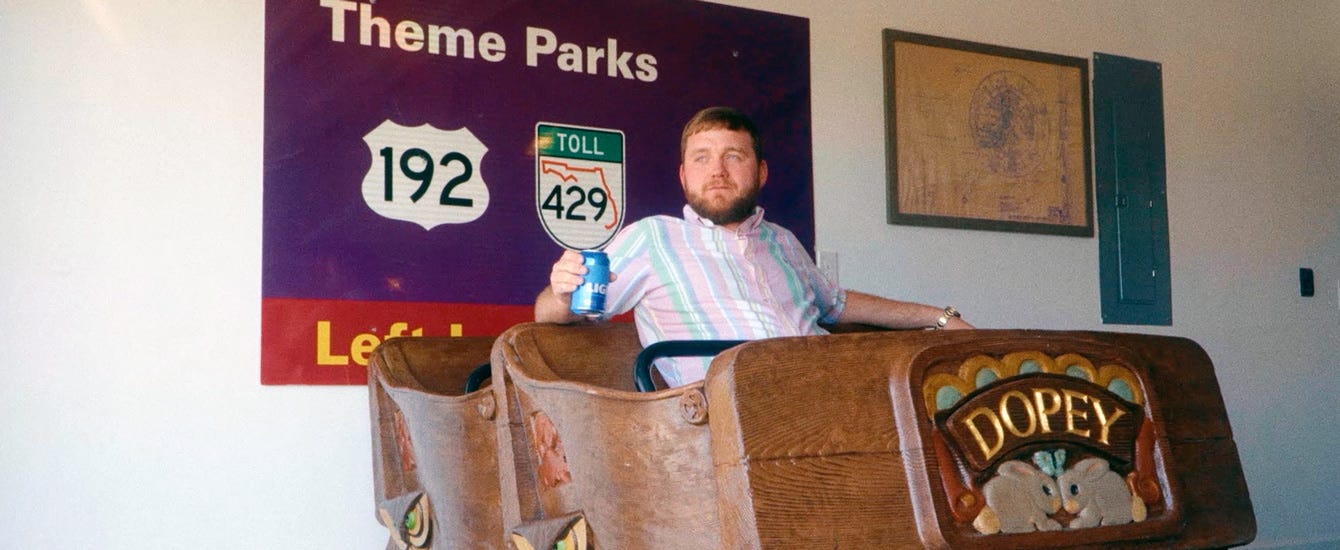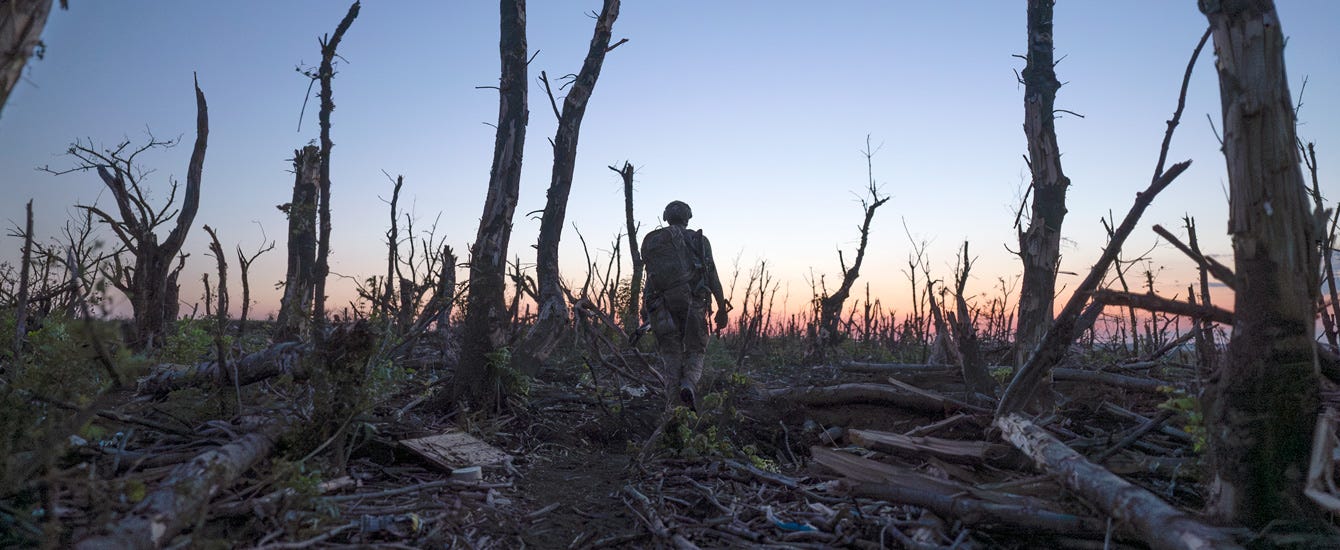IFFBoston Feature Documentary Highlights
2,000 Meters to Andriivka, Stolen Kingdom, and Deaf President Now!
At this year’s Independent Film Festival Boston I saw three documentary features that could not be more different in style and tone. Students in a recent class joked that I never assigned anything that wasn’t incredibly heavy, so for once I saw what some people would call an “entertaining” documentary, Stolen Kingdom, and was pleasantly surprised by how thought provoking it was. Deaf President Now! and 2,000 Meters to Andriivka take on more serious subject matters, but are riveting in different ways. As usual, my main regret after each film festival is that I could not see even more films!
Stolen Kingdom
Directed by Joshua Bailey
Stolen Kingdom documents the escapades and thefts by explorers of abandoned Disney theme parks. It is an entertaining, but also revealing, story about the limitations of consumerism. At first these late-night adventures seem like childish trespassing, but the documentary takes a dark turn when theft and conspiracy theories start to breed from the online popularity of these videos. Throughout, we are introduced to the online legends of documenting the underground world of abandoned theme parks.
The humor and eccentric, amoral characters are similar to early Errol Morris documentaries like Gates of Heaven and Mr. Death. The interviewees are so immersed in their obsession that they don’t realize how strange their behavior or ideas are. The older explorers like Dave “The Hoot” Ensign are in their 50s and seem to have more nostalgic and preservationist motivations for exploring. They want to have fun, but also feel they should capture footage and photos of these places in a meticulous way, so they are not completely forgotten. The younger vloggers, like Matt Sonswa and Patrick Spikes, have different intentions. Sonswa finds exploring these dangerous places exciting and thrilling and makes riskier decisions each time he visits. Spikes is a Disney fanatic, but is also trying to make a profit by stealing items to sell on the black market.
What most of these people have in common is a shared worship of Disney that slowly loses its luster as they go deeper into the abandoned parks. These beautiful dreamlike places from childhood are now rotting and haunting. In many ways they resemble the abandoned American cities which were once bustling with life, but are now mostly empty buildings. The explorers that search these abandoned parks are men dissatisfied with their everyday lives hoping to find some kind of treasure or meaning in the ruins.
Deaf President Now!
Directed by Nyle DiMarco & Davis Guggenheim

This empowering documentary is about the student-led protest movement to appoint a deaf president at Gallaudet University. Gallaudet is located in Washington D.C. and was founded in 1864. It was the only university in the world at the time designed for a deaf student community. But in 1988, a deaf president had still never been appointed to lead Gallaudet. When a handful of qualified deaf candidates were passed over for a hearing candidate, students organized massive protests on campus that captured the country’s attention. In the documentary the four student leaders Jerry Covell, Bridgetta Bourne-Firl, Tim Rarus, and Greg Hlibok (now in their 60s) recount the different strategies and obstacles they faced.
The story is fast-paced and engaging, taking us through the highs and lows of each day of the protests. It is structured to keep you on edge wondering if the students will succeed or fail. The interviews and old news coverage show the messiness and uncertainty of the protests. There are several moments in which the student leaders admit they felt lost, or they disagreed on the best methods to get their demands met. Dramatic scenes are also heightened by a motif in which the sound abruptly cuts out to illustrate the perspective of the students in a decisive moment. The audience in the theater was captivated—they enthusiastically applauded for the protestors at various times in the film.
Deaf President Now! is an important reminder of the power of protest and solidarity. It is impossible to watch this film and not consider recent protests on college campuses. Free speech of students has come under threat after new penalties and restrictions were put in place following the protests opposing the war in Gaza. The right to protest allows citizens to take an active role in their society. We should not take it away from anyone, even those we disagree with. As shown in the film, beliefs and opinions can change over time. We may find ourselves on the right side of history in one moment and be wrong in the next.
2,000 Meters to Andriivka
Directed by Mstyslav Chernov
This latest documentary by Mystlav Chernov is even more harrowing then his previous one. 20 Days in Mariupol won the Oscar in 2024 for Best Documentary Feature and captured the early days of the war mostly from the perspective of civilians under bombardment. 2,000 Meters to Andriivka is a much more difficult film to watch and focuses on soldiers worn out by years of fighting. Chernov follows a small brigade into various battles as they try to reclaim the village of Andriivka. Recapturing the village is part of the 2023 Ukrainian counteroffensive. Sometimes Chernov is on the ground with soldiers, but relies heavily on footage that was recorded on soldiers’ helmet cams. There is up close and chaotic footage of Ukrainian soldiers attacking the enemy and dying on screen.
Chernov has a strong anti-war message. He questions the largely superficial reasons for reclaiming Andriivka and other territories. The documentary emphasizes the futility and the high human cost of soldiers fighting to reclaim a completely ruined and uninhabited small village. This risky mission is actually very similar to the beginning of Stanley Kubrick’s 1957 anti-war film Paths of Glory about World War I. A French battalion of soldiers is ordered to capture a difficult territory because their side needs a win to boost morale. It becomes clear at the start of the fighting that most soldiers are likely to be slaughtered and they retreat. The key difference between this fiction film and the documentary is that some of the Ukrainian soldiers had not lost their faith in victory and continued fighting despite the immense loss of life.
But the documentary is brutal to the point where I was questioning why such excessive violence had to be witnessed to push forth an anti-war message. The public has been flooded with violent images and videos of the wars in Ukraine and Gaza, and I fear, as Susan Sontag warned, that their overuse has made us numb.1 The unrelenting violence in the documentary overwhelms any deep reflection and makes compassion difficult. Death is a reality of war, but when real deaths are captured on film and presented to an audience, new ethical concerns emerge. To capture a person’s final breaths is an incredibly shocking and intimate act. Whether you believe in an afterlife or not, the camera can steal the soul. That image or video can become the defining narrative of a person’s life. The soldiers who died on screen will be remembered as having lost their lives in a pointless battle for an abandoned village.
My essay from 2024 on 20 Days in Mariupol analyzes that documentary in the context of Susan Sontag’s book-length essay “Regarding the Pain of Others.”




